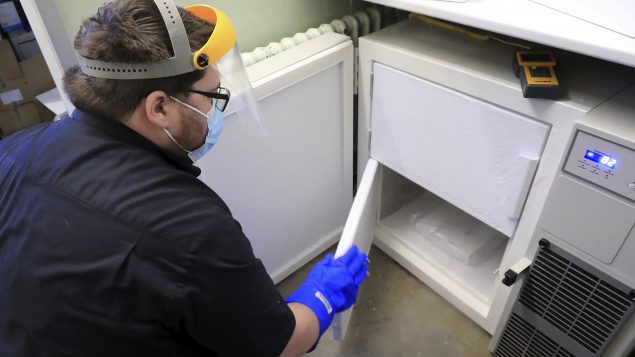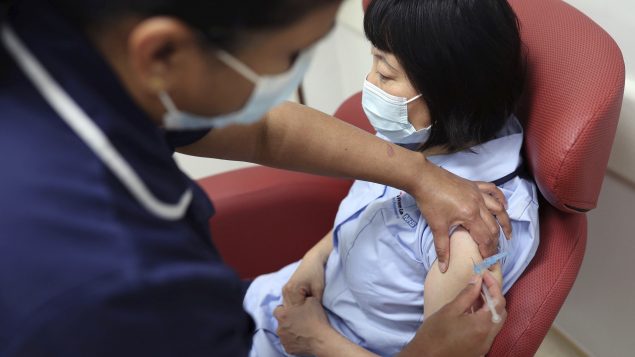
By David Ljunggren, Steve Scherer
OTTAWA (Reuters) - Canada will start receiving its first doses of Pfizer Inc’s COVID-19 vaccine before the end of December, sooner than expected, with millions more to follow in early 2021, officials said on Monday.
The news could help the minority Liberal government of Prime Minister Justin Trudeau fend off attacks from opposition parties that have accused Ottawa of acting too slowly to tackle a worsening coronavirus second wave.
Officials had initially expected to get a total of six million doses of vaccines from Pfizer and Moderna Inc by end-March. That would be enough to inoculate three million people as both vaccines require two shots about a month apart.
But Trudeau said up to 249,000 doses of the vaccine Pfizer is producing with German partner BionNTech SE would arrive this month, and a further three million doses should be delivered at the start of 2021.
Saying vaccinations could start next week, Trudeau dismissed the suggestion his government had pressed for early delivery to relieve political attacks by the opposition.
“There is a tremendous amount of uncertainty in terms of which vaccines were going to arrive first ... we wanted not to get people’s hopes up,” he told reporters, repeating Ottawa expects regulators to approve the Pfizer vaccine this week.
Erin O’Toole, leader of the official opposition Conservatives, said it was unacceptable Trudeau had not made clear when every Canadian would be vaccinated.
Several of the 10 provinces are reimposing restrictions on businesses and limiting the size of gatherings as the number of new cases sets daily records. Canada has reported a total of 415,182 cases of COVID-19 and 12,665 deaths.

Trudeau said isolated Indigenous communities were a “priority population” for the vaccine and would be among those receiving the first inoculations at the start of next year.
For logistical reasons, the three northern territories have requested Moderna’s vaccine, which does not have the same ultra-cold delivery requirements as Pfizer’s, one official said.
Ontario and Quebec, the two most populous provinces, account for 67% of the total cases and 87% of the deaths.
Ontario announced on Monday that it would prioritize vaccinating healthcare workers and staff, residents and essential visitors in long-term care homes, and adults in Indigenous communities.
Quebec said it would receive 4,000 doses next week and start vaccinating nursing home residents.
Additional reporting by Moira Warburton in Toronto; Editing by Chizu Nomiyama, Bill Berkrot and Sonya Hepinstall
 A pharmacy technician in London, England works to store the world's first delivery of Pfizer’s COVID-19 vaccine. The cooler temperature reads minus 82 Celsius. (Gareth Fuller/Pool via AP)
A pharmacy technician in London, England works to store the world's first delivery of Pfizer’s COVID-19 vaccine. The cooler temperature reads minus 82 Celsius. (Gareth Fuller/Pool via AP)
Canada’s largest ever immunization plan to start in December
Canadian Prime Minister Justin Trudeau today announced that pending approval by the health department, the first Pfizer COVID-19 vaccines could be rolled out as early as the week of December 14, 2020. This comes as the numbers of infections and deaths rise across the country.
Trudeau said that by the end of 2020, Canada should receive up to 249,000 doses and be able to start what he called the largest mass vaccination operation in Canadian history. Health Canada is expected to approve the Pfizer vaccine this week.
Trudeau sought to reassure Canadians that Canada has its own rigorous testing and that once vaccines are approved, they will be safe and effective.
When asked about the small quantity of vaccines that will initially be delivered, Trudeau suggested this was a good thing as it will allow authorities to make sure the rollout is efficient and no vaccines are wasted. He added that large numbers of vaccines by this company and others will be delivered on a continuing basis in 2021.

Nurses at a London, England hospital simulate the administration of the Pfizer vaccine to support staff ahead of the rollout. This kind of practice is going on in Canada. (Yui Mok/Pool Photo via AP
Provincial and territorial authorities responsible for administering vaccine
The Pfizer vaccine must be kept at ultra-cold temperatures. In order to ensure that, batches will be delivered to 14 urban centres across the country. Systems for delivery and storage are currently being tested in Canada. As health care falls under the jurisdiction of the provincial and territorial governments, it is they who must make arrangements to administer the vaccines.
Federal authorities have provided guidelines on who should get priority but Trudeau said it will be up to provincial and territorial authorities to decide who goes first according to local conditions.
Indigenous people in remote communities will have to wait
Although Indigenous people have been listed among the more vulnerable, those living in remote communities will not have access to this first batch of Pfizer doses. Those communities do not have the ultra-cold storage capacity.
This announcement came after the Trudeau government faced allegations that Canada might be among the last developed countries to have access to COVID-19 vaccines because Canada does not have the capacity to make them at home. Trudeau repeated previous statements to the effect that Canadian officials have been shopping for vaccines with several different companies and have secured the “most diverse portfolio” of vaccines of any country.
Trudeau said that while the vaccine news provides hope, he urged Canadians to not let their guard down. He called for people to continue to wear masks, wash their hands, keep social distancing and to avoid gathering. Many provincial governments have asked people to avoid the traditional Christmas gatherings and to restrict themselves to being only with people living in their own households.
Pfizer to watch Canada’s coronavirus vaccine rollout ‘very closely’ for wastage, Trudeau says
By Rachel Gilmore Global News
Posted December 7, 2020

Prime Minister Justin Trudeau announced on Monday that his government had “secured an agreement” for early delivery of up to 249,000 doses of the Pfizer-BioNTech vaccine candidate in December, with the first shipment of doses set to be delivered next week
Prime Minister Justin Trudeau warned that the pharmaceutical giant Pfizer will be watching “very, very closely” to ensure that none of their hotly anticipated coronavirus vaccines is going to go to waste.
“You can imagine that any responsible company like Pfizer is going to want to make sure that none of their vaccines are going to be wasted through inability to properly store, transport or administer every single dose of those vaccines, [which] are extraordinarily precious right now,” Trudeau said.
“So they will be looking very, very closely at our ability to do that.”
READ MORE: First coronavirus vaccine shots could be doled out in Canada next week
His comment comes on the heels of the announcement that Canadians could start receiving the Pfizer vaccine as soon as next week – pending its Health Canada approval, which Trudeau said is expected this week.

Trudeau explained that since the vaccine requires two doses, the initial shipment of up to 249,000 doses will be going to the same people – meaning Canada must not only be getting the vaccine doses into Canadian communities but must then ensure those select Canadians that receive the first jab also all get their second shot no more than three weeks later.
“We’re facing the largest immunization in the history of our country,” he said.
“This is no small task, which is why we have a clear plan. Our government, through the national operations centre, has been working with the provinces and territories to ensure we’re ready to roll out vaccine doses as soon as they’re approved and delivered.

However, Canada can’t receive the coronavirus vaccines until Pfizer is assured the provinces and territories are ready to receive those doses, Procurement Minister Anita Anand said, speaking in the same Monday press conference.
“Before those shipments occur, Pfizer needs to be assured that the provinces and territories are ready, in fact, to receive those doses,” Anand said.
She explained that Maj.-Gen. Dany Fortin, who is leading the Canadian military’s role in coordinating vaccine rollout logistics, is already working alongside provinces and territories to ensure their readiness.
“Once we are assured of provincial and territorial readiness to receive, then we will be able to pass the baton to the provinces and territories. So the last kilometre, in fact, is with the provincial and territorial jurisdictions and we will carry the baton as far as we can along that line,” Anand said.

Trudeau explained that once these vaccines arrive on Canadian soil, they’ll be distributed on a per-capita basis – meaning provinces and territories will receive equal shares of the vaccines in relation to their population.
“Next week’s distribution will happen through 14 different sites that have been identified across the country, one in each province and two in our four largest provinces,” Trudeau explained.
“This is to be able to initially get doses out to the most vulnerable people, but also to demonstrate and to operationalize what is going to be an incredibly complex mobilization of vaccines across the country.”
Canada has also identified four priority groups who will receive vaccines first: residents and staff at seniors’ residences, Canadians over the age of 70, frontline health-care workers, and adults in Indigenous communities.
No comments:
Post a Comment